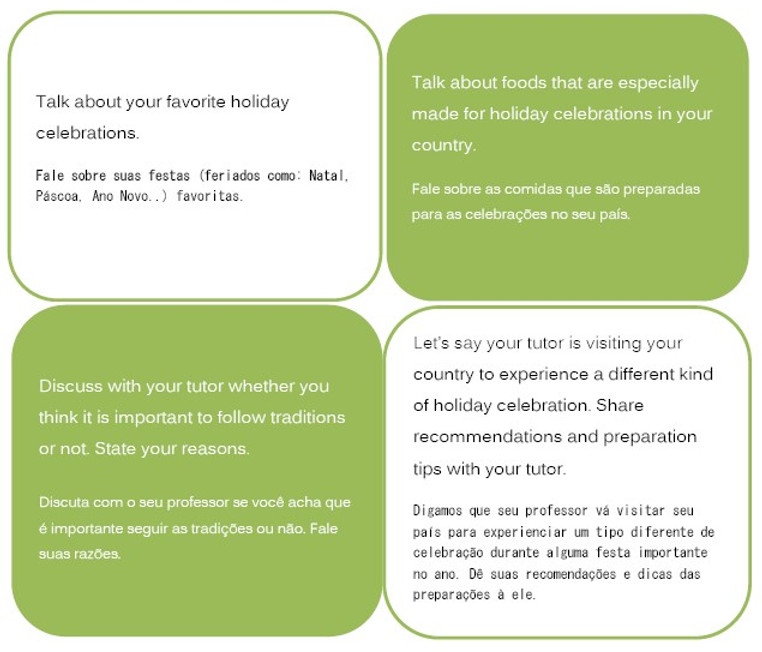

IT’S CUSTOMARY TO…
Holiday Traditions
Picture Conversation
A. Read the dialogue below.
Leia o diálogo abaixo.

Read the dialogues below. The vocabulary words and expressions from the previous exercise are highlighted for your reference.
Leia o diálogo abaixo. As palavras e expressões do exercício anterior estão grifadas como referência.
A: Tutor Wow, the holiday season countdown has begun. Do you have any plans for Christmas?
B: Well, we usually gather at my sister’s place on Christmas eve. But this year, we’re planning to go on a
ski trip. How about you?
A: I haven’t really thought about it yet. I’m thinking of visiting my parents and friends back home.
B: That’s not a bad plan. You better decide soon, it’s tough to get tickets these days.
A: Mom, do you think it’s okay to break with tradition on thanksgiving?
B: What do you mean?
A: Hmm, it’s customary to prepare a roasted turkey but would it matter if we have roasted duck instead?
B: Well, while traditions are important, thanksgiving is all about being grateful for what we have. So it
doesn’t matter if we have turkey or duck.
Vocabulary
Vocabulário
holiday - feriado
Example: We usually don’t work on national holidays.
Nós normalmente não trabalhamos em feriados nacionais.
thanksgiving - Dia de Ação de Graças
Example: Canada celebrates thanksgiving on the second Monday of October.
O Canada celebra o Dia de Ação de graças na segunda Segunda-feira de Outubro.
countdown - contagem regressiva
Example: We just started the 10-day countdown to New Year’s day.
Nós acabamos de começar a contagem regressiva para o Ano Novo.
resolution - Resolução
Example: This year I want to complete everything on my New Year’s resolution list.
Esse ano eu quero completar tudo na minha lista de resoluções de Ano Novo.
tradition - tradição
Example: It is their tradition to visit a shrine or temple at least once a year.
Faz parte da tradição deles visitar um tempo ou santuário pelo menos uma vez por ano.
Expressions
Expressões
It’s customary…
É costume…
Example: It’s customary for women to give chocolates on Valentine’s Day.
É costume as darem chocolates para no Dia dos Namorados.
break with tradition
quebrar com tradições
Example: They were among the first to break with tradition when they decided to introduce controversial issues in their writing.
Eles estão entre os primeiros a quebrar com as tradições quando decidiram introduzir assuntos controversos nos seus textos.
holiday season
época das festas
Example: Shops are very busy during the holiday season.
As lojas ficam muito cheias durante a época das festas.
Controversial: controverso
1. Complete the dialogue using the new vocabulary words and expressions we learned.
Complete o diálogo usando o vocabulário e expressões novas que aprendemos.
Student Student Hey, Jim. Happy New Year! How did the New Year’s ___________ party go?
Tutor Thanks, Kim! Happy New Year, to you too! The party was awesome except that I had a bad
hangover the next day.
Student I knew it. You probably should add ‘quit drinking’ in your new year’s ___________ list.
Tutor Oh c’mon, you know that’s not realistic at all.
2. Complete the dialogue using your own answers. You can use any of new vocabulary words and expressions, if possible.
Complete o diálogo com suas próprias respostas. Você pode utilizar qualquer vocabulário ou expressão nova, se possível.
Tutor Do you think it’s important to follow holiday traditions?
Student That depends. I think ___________________________________________________.
Tutor You have a point there. What are some of the important holiday traditions in your country?
Student Well, ___________________________________________________.
Quick Questions and Answers (Q&A)
3. Make a text:
1. What is your favorite holiday? Why?
2. What do you usually do on extended holidays?
3. What national holidays do you celebrate in your country?
4. Do you have any special way of celebrating New Year’s Day in your country?
5. Name one or two important holiday traditions in your country.
Você pode utilizar o link para correção de textos em inglês e depois transcrever as respostas nos espaços abaixo.



4. Say it! (converse sobre os assuntos abaixo)






